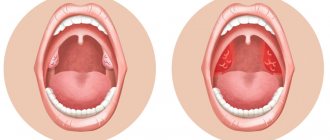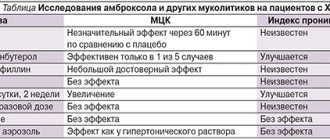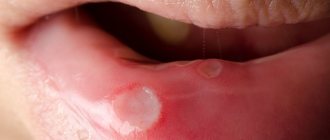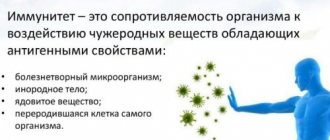If you have pain, dryness, soreness, a feeling of a “lump” in the throat, painful swallowing, then most likely it is inflammation of the mucous membrane of the back wall of the pharynx - pharyngitis . The throat with pharyngitis is red and inflamed.
Treatment of this disease must begin as early as possible, when the first symptoms appear. This will help avoid serious complications. Our clinic receives daily consultations from experienced otolaryngologists, candidates and doctors of medical sciences.
Why is pharyngitis dangerous?
Untimely treatment of pharyngitis is dangerous because the disease becomes chronic and has serious complications, including sinusitis, sinusitis, otitis media, kidney inflammation (glomerulonephritis), etc. But the most dangerous possible consequences are rheumatic lesions of the heart and joints.
1 Diagnosis of pharyngitis in MedicCity
2 Diagnosis of pharyngitis in MedicCity
3 Diagnosis of pharyngitis in MedicCity
Treatment of pharyngitis should be carried out only under the supervision of an ENT doctor! Acute pharyngitis may be the first manifestation of infectious diseases (measles, rubella, scarlet fever), requiring a different treatment regimen than for pharyngitis.
Chronic pharyngitis may not be an independent disease, but a manifestation of chronic gastritis, cholecystitis, pancreatitis and other gastrointestinal pathologies. With gastroesophageal reflux disease, for example, acidic gastric contents often enter the throat during sleep, which causes the development of chronic catarrhal pharyngitis .
Until the underlying cause of the disease is eliminated, local treatment in this case will not produce results.
Antiviral agents
Antiviral medicine for pharyngitis is required if the throat infection is viral in nature. In this case, there is no bacterial infection attached, and antibiotics will not be effective. Antiviral drugs can even be homeopathic, but they are prescribed much less frequently due to the rather long period of their accumulation in the body before the action begins.
For the use of antiviral drugs to be effective, it must be established that the disease is viral in nature. It will not be possible to determine the causative agent of the disease on your own, so you need to contact an ENT doctor. A specific antiviral drug will be prescribed depending on what pathogen has affected the mucosa.
Reasons for the development of the disease
Common causes of pharyngitis are inhalation of cold or polluted air, exposure to chemical irritants (alcohol, tobacco).
Infectious pharyngitis can be caused by various microbes (strepto-, staphylo-, pneumococci), viruses (influenza, adenovirus) and fungi (candida). The disease can also develop as a result of the spread of infection from a nearby source of inflammation (for example, sinusitis, rhinitis, dental caries).
Difficulty in nasal breathing and overuse of vasoconstrictor drops can also cause pharyngitis.
Symptoms of pharyngitis may be present with the so-called postnasal syndrome (the English term is “postnasal drip”), when the constant flow of pathological secretion from the nasal cavity or paranasal sinuses along the back wall of the pharynx causes discomfort and a sore throat. This condition may be accompanied by wheezing, so it is necessary to carry out a differential diagnosis with bronchial asthma.
Classification of pharyngitis
The disease can occur in acute and chronic form.
Acute pharyngitis develops as a result of exposure to the mucous membrane of the pharynx by an aggressive factor (infection, chemicals, etc.). The course of the disease is favorable.
Chronic pharyngitis can develop as a consequence of untreated acute pharyngitis or be an independent disease resulting from prolonged irritation of the pharyngeal mucosa. The course of chronic pharyngitis is characterized by phases of exacerbation and remission.
1 Throat examination
2 Throat sanitation
3 Diagnosis of pharyngitis in MedicCity
Tablets and lozenges and sprays
A resorption remedy for pharyngitis must include an antiseptic drug, a throat tissue softener and a moisturizing component. Some medications also include an anesthetic component to quickly eliminate unpleasant symptoms. Also, tablets for pharyngitis may contain plant extracts or essential oils.
Lozenges have less therapeutic activity than tablets. At the same time, you can consume quite a lot of them during the day, combining them with tablets. The main medications for resorption in case of illness are:
- Falimint is an effective anti-inflammatory drug with an analgesic effect;
- Lizobact - the medicine must be sucked, and not chewed or cracked. In order for the drug to act on the mucous membrane for as long as possible, it is necessary to swallow saliva and try to retain it in the throat area;
- Septolete are popular lozenges that contain an antiseptic and essential oils. The components of the drug slowly act on the mucous membrane, which allows for maximum therapeutic effect. They are recommended as an aid;
- Septogal is a medicine that has antiviral and antiseptic effects. The preparation also contains essential oils. The effect of using the product is felt after the first time.
There are also a large number of drugs that have similar effects, but are less popular.
Sprays for irrigating the throat for pharyngitis are most often prescribed as an auxiliary element of therapy. The most popular are Chlorophyllipt and Inhalipt.
This category of drugs is one of the few that can be used without medical prescription, since it is not capable of causing harm if all contraindications are taken into account.
Symptoms of pharyngitis
The symptoms of pharyngitis (acute and chronic) are similar to each other, but there are still slight differences:
Acute pharyngitis
- dryness and sore throat;
- pain when swallowing;
- less often – general malaise, increased body temperature;
- possible irradiation of pain to the ears.
Chronic pharyngitis
- dryness, sore throat;
- sensation of a lump in the throat, which makes you want to cough;
- dry cough.
COMPLICATIONS OF PHARINGITIS OR WHAT HAPPENS IF IT IS NOT TREATED OR TREATED INCORRECTLY
The most serious complications of pharyngitis are represented by autoimmune diseases that arise as a result of increased sensitivity of the body to the microbes that cause the disease... What does this mean? This means that strep throat itself is not very dangerous, BUT it can lead to very serious consequences if left untreated. In this regard, streptococcal pharyngitis is especially dangerous, as a result of which purulent and non-purulent complications can develop...
Purulent complications:
- A peritonsillar abscess is an inflammation in the peritonsillar tissue (the area around the tonsils), where an abscess forms.
- Retropharyngeal abscess - formed as a result of suppuration of the lymph nodes and tissue of the retropharyngeal space.
Non-purulent complications:
- Inflammation of the kidneys (post-streptococcal glomerulonephritis).
- Rheumatism.
With rheumatism, inflammatory nodules form in various tissues of the body. For example, if they form in the heart muscle, on the inner surface of the heart or, in the most severe case, on the valves, they can cause disruption of the flow of blood through the heart, which can lead to undesirable consequences, including the formation of heart disease... Inflammatory nodules can also be deposited in the skin, muscles, joints, which may result in swelling and pain...l
Pharyngitis in children
Pharyngitis in children is easy to recognize. Symptoms of pharyngitis in children may be as follows. The child complains of scratching and sore throat, it is difficult for him to swallow, and he coughs. The back wall of the throat is red, covered in small tubercles, but the tonsils on both sides of the tongue are in normal condition, pink and clean. With pharyngitis, the child experiences weakness, headache and sore throat, lack of appetite, and difficulty swallowing.
Acute pharyngitis is more common in children and adolescents. Typically, acute pharyngitis occurs against the background of colds.
Treatment of pharyngitis in children
How to treat pharyngitis in children? Before starting treatment, you need to establish the cause of the disease. Then remove too hot and cold foods, cold drinks (especially soda) from the child’s diet, and refrain from spicy, salty and solid foods.
You can apply warm compresses to the neck, warm the child’s feet, drink warm milk with honey and butter. Gargle with a decoction of chamomile, oak bark and other anti-inflammatory herbs.
Pharyngitis in adults
Unlike children, chronic pharyngitis is most common in adults.
Patients are bothered by pain, dryness and soreness in the throat, they find it difficult to swallow, they often want to cough, but the contents are difficult to cough up. With chronic pharyngitis, headaches occur, sleep deteriorates, and general weakness is noted.
The main causes of pharyngitis include:
- untreated colds;
- remaining caries in the mouth;
- smoking;
- frequent stress;
- weakened immune system;
- drinking cold (straight from the refrigerator) and too hot drinks;
- uncontrolled use of medications;
- allergy;
- poor environment and work in hazardous production.
Treatment of pharyngitis
When treating pharyngitis, qualified diagnostics are required, including examination by an otorhinolaryngologist, a smear from the oropharynx for flora with determination of sensitivity to antibiotics and bacteriophages, and also, if necessary, consultation with a gastroenterologist, general and biochemical blood tests, general urinalysis, and ultrasound of the abdominal cavity.
1 Laboratory diagnostics in MedicCity
2 Laboratory diagnostics in MedicCity
3 Laboratory diagnostics in MedicCity
Treatment of pharyngitis includes general measures and local therapy .
General events
It is necessary to sanitize the upper respiratory tract and oral cavity - eliminate adenoids, rhinitis, deviated nasal septum, sinusitis, caries, etc. It is also important to cure gastrointestinal diseases, which are often the cause of the development of pharyngitis.
Medicines aimed at increasing immunity (hardening procedures, vitamin therapy, etc.) are also prescribed.
It is recommended to reduce the impact of negative environmental factors on the pharyngeal mucosa (smoking, dust, chemicals, etc.).
Local treatment
Drug therapy includes antibiotic therapy as indicated, irrigation of the pharynx with medications, lubrication of the mucous membrane of the posterior pharyngeal wall, etc.
Alkaline, oil-alkaline, herbal inhalations are very effective against pharyngitis. It is also important to gargle frequently with antiseptic solutions (the patient can do this at home independently).
The course of treatment for chronic pharyngitis usually includes 10-14 treatment procedures performed daily or every other day. It is also recommended to carry out maintenance courses of treatment 2-3 times a year.
Remember that tobacco smoke, strong alcohol, household dust, cold air can cause exacerbation of chronic pharyngitis! During your illness, avoid drinking alcohol, smoking, and walking in cold, damp weather!
For pharyngitis, treatment should only be prescribed by an otolaryngologist! Medicines purchased at random or on the recommendation of friends may turn out to be useless or harm your health!
Literature
- Gostry A.V., Mikhailova N.A., Simonova A.V. Chronic pharyngitis: etiology, pathogenesis, treatment. New approaches to assessing etiopathogenesis // Archives of Internal Medicine. —2019. - No. 1. - P. 32-43.
- A.V. Gurov, M.A. Yushkina, O.A. Guseva Local therapy of inflammatory diseases of the oropharynx // Difficult patient No. 3, VOL. 16, 2021, p. 41-46.
- S. Ya. Kosyakov, I. B. Angotoeva. Non-infectious causes of chronic pharyngitis. Medical Council, No. 20, 2021, pp. 112-115.
- Sobolev V.P., Karpova O.Yu., Artamonova P.S. New possibilities for the treatment of inflammatory diseases of the pharynx. // Consilium Medicum. 2018; 20 (11): 30–32.
- Deryabin P.G. Study of the antiviral properties of the drug “hexoral” in vitro against a number of viruses that cause acute respiratory infections and herpes [Electronic resource] / P.G. Deryabin, G.A. Galegov // Bulletin of Experimental Biology and Medicine. - 2015. - No. 9. — P. 72-75.
- Instructions for use of the drug HEXORAL® aerosol:
- Instructions for use of the drug HEXORAL® solution:
- Instructions for use of the drug HEXORAL ®TABS:
- Instructions for use of the drug HEXORAL®CLASSIC:
- Instructions for use of the drug HEXORAL®TABS EXTRA:








